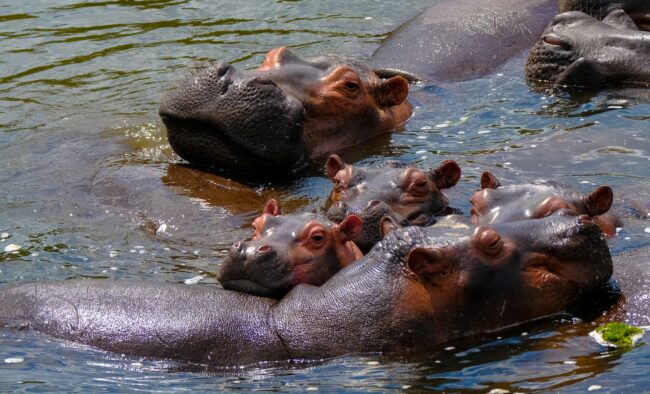Have you ever been intrigued by the lives of one of Africa’s most captivating yet often misunderstood animals—the hippopotamus? The name “hippopotamus” may come from Greek words meaning “water horse,” but there’s much more to these creatures than their aquatic habitats. In this comprehensive guide, you’ll discover everything from their surprising lifespan to the risks they face in their natural environment. So, let’s get started on this educational journey that not only satisfies your curiosity but also adds depth to your understanding of these incredible animals.
Different Types of Hippos: Pygmy and Common River Hippos
When talking about hippos, most people think of the common river hippo or Hippopotamus amphibius. However, there’s a smaller, less well-known relative: the pygmy hippo (Choeropsis liberiensis). While common river hippos are gregarious and spend much of their time in large pods, pygmy hippos are generally more solitary and elusive, making them a rarity even in their native African forests. Understanding the types of hippos enriches your perspective on the species, as each has unique characteristics and lifestyles.

The Longevity of Hippos: Influenced by Habitat
Hippos enjoy relatively long lives, with an average lifespan between 40 and 50 years. This longevity isn’t just a number; it’s closely tied to their habitat. For instance, a hippo in a protected area with abundant food and fewer predators is likely to live longer than one in a region plagued by poaching or environmental degradation. Interestingly, hippos in captivity often outlive their wild counterparts, reaching ages up to 65, thanks to regular medical care and a controlled environment.
The Life Cycle of a Hippo
From birth to maturity, the life of a hippo is a fascinating tale of survival and social interaction. Newborn hippos are welcomed into the world underwater, a unique birthing environment that sets them apart from most mammals. Mother hippos are attentive caregivers, often nudging their young to the water’s surface for their first breath of air. These young calves are born swimmers, weighing between 55 and 120 pounds at birth. The development of a hippo calf involves several milestones, including the transition from nursing to grazing on grass at around three weeks of age. Female hippos typically reach maturity at five to six years, while males take a bit longer, becoming adults at six to seven years.
Hippopotamus Diet
The diet of a hippo is generally herbivorous, focused mainly on grazing. Contrary to popular belief, hippos are not strictly aquatic eaters; they venture out at night to graze on short grasslands. Each night, they consume around 1 to 1.5% of their body weight or roughly 88 pounds of vegetation. Their sedentary lifestyle is strategic, allowing them to conserve energy for these nightly feeding forays. Their senses, like acute hearing and smell, guide them in locating their food, making each meal a small adventure.
Where Do Hippos Live?
Habitat plays a crucial role in the life and well-being of a hippo. These semi-aquatic creatures prefer areas with abundant grass and water bodies that are neither too shallow nor filled with obstacles like large rocks. Social by nature, hippos often form groups—sometimes with up to 200 members—led by dominant males. While the common river hippo prefers open waterways, the pygmy hippo is more at home in the forested areas near marshes in West Africa.
The Predators and Perils Facing Hippos
Hippos may be one of Africa’s largest mammals, but they aren’t without threats. Habitat loss due to human activity, like dam construction and agricultural expansion, poses significant risks. Additionally, the illegal ivory trade has had a devastating effect on hippo populations. While hippos have formidable teeth and tusks to defend themselves, their canines are softer than elephant tusks, making them easier targets for poachers seeking ivory.
Human-Hippo Conflict
In regions where human settlements are expanding, conflict between hippos and humans is becoming more frequent. Hippos sometimes wander into farms, causing crop damage, and there have been instances of aggressive encounters between humans and hippos, especially when boats enter their territories. As humans continue to encroach on their natural habitats, these interactions are expected to increase, further stressing the already delicate balance between people and hippos.
Conclusion
Understanding the complexities of a hippopotamus’ life from birth to adulthood offers a glimpse into a world that is at once fascinating and fraught with challenges. Whether it’s the marvel of underwater birth or the increasing perils from human activity and illegal trade, hippos remind us of the delicate balance that must be maintained for these magnificent creatures to thrive.

Editorial Staff
Our writers, editors, content managers, and SEO specialist. We all take part in crafting amazing articles. We spend hours ensuring that each article is based on facts, researched, and thorough. You'll never want to click the back button to look for more answers other than here!
